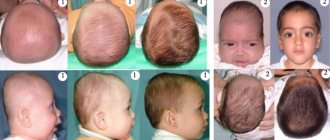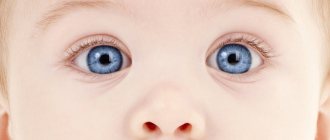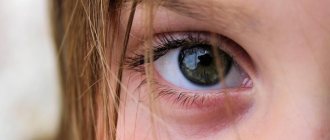The way a newborn behaves when he sleeps reflects his emotional well-being. An infant can remain asleep for about 20 hours during the day. Sometimes babies smile in their sleep and even start laughing.
Watching a smiling toddler while he sleeps is very interesting and pleasant for his parents. Scientists have been able to prove that in such moments the child re-experiences everything that happened to him while he was awake. The child’s impressions are so strong that he perceives everything violently with increased emotionality.
The baby's central nervous system is just going through the stages of its formation. That is why any event does not go unnoticed and is imprinted on the level of the child’s subconscious. Over time, acute sensitivity will be replaced by a more equal attitude towards everything around the world.
Features of a child's sleep
Birth and exposure to unknown conditions is a very tiring task for any baby. This is what explains such a long duration of sleep in babies in the first months of life, compared to adults.
And in general, infants sleep completely differently than their parents. The baby's deep sleep phase begins in about half an hour. It does not last long, and after a while it is replaced by the stage of shallow sleep. Its duration is much longer, from which we can conclude that newborns sleep lightly most of the time. For this reason, their sleep can be considered very sensitive, and babies themselves can be considered extremely susceptible to external stimuli.
Often during the superficial phase, young children show various emotions: they may cry, grunt, or, on the contrary, smile and even laugh.
By paying close attention to a child’s behavior during sleep, one can judge his physical and psychological state. For example, by crying, a baby is able to show that he is bothered by intestinal colic, and a groaning child is often constipated. In turn, a smile, according to most researchers, indicates a favorable emotional background and the absence of any disturbances in the functioning of the child’s body.
Thus, for the most part, the shallow sleep of newborns, replete with various kinds of manifestations, has a protective function. It is thanks to such external signs that one can at an early stage suspect the presence of any physiological or psycho-emotional problems in a child and, accordingly, eliminate them.
How to speed up the appearance of a smile?
If you have a very serious child who is in no hurry to please his parents with his charming smile, do not worry and start running to doctors. There is no reason to worry about the lack of a smile if:
- the baby is not three months old;
- holds the head well;
- focuses the gaze;
- can concentrate on one thing (for example, looking at a toy).
If your baby is over 12 weeks old and still isn't smiling, you should talk to your pediatrician.
If your baby isn't smiling, you may need to pay him a little more attention. Communicate with him while he is awake, show him toys, carry him around the house.
Turn on calm music, sing songs, tell nursery rhymes. And, of course, every time you approach a child or pick him up, smile at him.
How to make a newborn smile? Make a face at him!
Until the age of one month, a child’s best toy is his mother’s face. Let your baby look at him from a distance of 30 centimeters, start changing his expression.
Don't forget to smile! You will see with what interest the baby will watch you.
At the age of two months, the child is already interested in photographs of people and drawn faces. A smile can also arise when you see a picture in a magazine.
Until one month of age, a newborn can clearly distinguish between dark and light.
You can make black and white images of various facial expressions for him (each the size of a landscape sheet) and start showing him from a distance of 30 cm. This exercise will also help speed up the development of your baby’s facial expressions.
Just remember that no two children are the same!
Although the “average” age for the appearance of a child’s smile is known, this does not mean at all that if the baby pleased his parents at a different time, then he has some kind of developmental pathology.
Each child's facial expressions are individual and develop at the pace they need. There is no need to worry if the baby smiles rarely and little; the older he gets, the more often he begins to show you a satisfied expression on his face.
If, however, something in your newborn’s behavior bothers you, do not try to “correct” it yourself. Anything you think is unusual or strange should be discussed with your pediatrician.
When a child starts smiling, parents forget about all their worries and experience real happiness. Give your baby your tenderness and love, and he will definitely repay you, one day beaming with a charming smile that is intended only for you.
- Caring for a newborn baby.
- How can a young mother manage everything after giving birth?
- A 3 month old baby sucks his fist.
Doctors' explanation about babies smiling in their sleep
Parents can admire how little children sleep forever. However, when they see that the baby is smiling in his sleep, mothers and fathers begin to think about the reasons for this phenomenon. This comes as a surprise to many, since there is a widespread belief that infants cannot dream of anything and, accordingly, evoke positive emotions.
In fact, a real dream can make a newborn smile, but not only that.
Dreams
Scientists have long proven that children dream. Naturally, the main character for a child in his dreams is his mother. When a newborn smiles in a dream, we can assume that he sees his mother’s face, hears her voice, the beat of her heart, feels the warmth of her chest, or even smells his native smell. It is this object that evokes the most joyful emotions in the baby and is associated with food, coziness and comfort.
Over time, the baby's dreams will become more diverse due to the fact that every day he will learn more and more about the world around him. In this way, the number of dream objects will gradually increase. All this will undoubtedly be reflected on his face when he sleeps.
There is also an opinion in the scientific community that during sleep, a baby gains access to information stored in genes. Researchers suggest that in their dreams, babies are able to reproduce images from the lives of their ancestors. This gene memory actively stimulates the development of feelings and thinking.
Other reasons
The reason why children smile in their sleep may be completely natural physiological processes. Thus, pediatricians believe that a baby’s smile only means a grimace. The facial muscles of a newborn can spontaneously tense and relax, which causes some semblance of a smile.
In addition, every day is rich in new impressions and discoveries for a newborn. These circumstances affect the mental state of the baby, increasing its excitability and activity. Such an emotional background will, without a doubt, be reflected in the behavior of the sleeping child and his facial expressions. In order to reduce the likelihood of such manifestations, it is recommended to somewhat limit the amount of entertainment and new experiences in the life of a new person.
The fact that the baby laughs in his sleep may indicate that there has been a change in sleep phases - from slow to fast. In addition to laughter, other manifestations may be observed: muttering, grunting, erratic movements of the limbs, etc.
How to behave to make your baby smile?
A child’s smile is a response to affectionate treatment and care for him. Be attentive to the needs of the baby, make sure that the newborn is warm, dry and well-fed.
Talk to your baby in a calm, gentle voice, start singing songs from the first days, and carry him in your arms. A child learns facial expressions from adults, so smile when you address the baby.
After one month of age, you can start doing a special exercise. Show your baby different facial expressions while talking to him. You can make faces.
The baby begins to adopt your facial expressions, and thus learns to control the muscles of the face, and also understands which facial expression suits each mood.
Optimal conditions for healthy baby sleep
In order to provide your beloved child with the most comfortable and healthy sleep and see only a smile on his face, it is important to create the necessary conditions for this:
- Try to make the most of the night time for rest. Little children's time orientation is still undeveloped, so to form a routine, you don't need to be afraid to wake up your baby during the day, and at night, let him get enough sleep.
- Create a favorable atmosphere for immersion in dreams. To do this, you need to avoid any type of activity before bedtime and give preference to the most calm activities possible.
- Put your baby to bed at approximately the same time every day so that his biological clock will eventually tell him when it's time to sleep.
- Do not forget about the temperature conditions in the children's room - the air should not be colder than 20 and warmer than 23 degrees. Also pay attention to the humidity level in the room; it should not fall below 55%. Regular wet cleaning and using a humidifier will help with this.
The smile of a baby, without a doubt, evokes affection among those around him. However, when emotions no longer seem so harmless and become overly expressed, parents begin to worry. And there really are reasons for concern.
Alarming symptoms
Sometimes, in overly impressionable children, a slight smile develops into real laughter. Such excessive emotionality may indicate some kind of disorder, primarily neurological.
It often happens that the psycho-emotional background of a newborn changes dramatically in a dream: first he suddenly begins to cry, and then laugh. At the same time, it is almost impossible to calm the baby down; the baby does not react to anything. After some time, such manifestations disappear as quickly as they appeared.
However, even if your child behaves this way, you should not immediately rush to look for potential symptoms.
The fact that the baby begins to laugh or even guffaw in his sleep, but at the same time feels good, sleeps, eats and is not very active, suggests that this is just his peculiarity and there is no reason to worry. In any case, to establish the exact cause, you should consult a doctor and undergo the necessary examinations.
Baby according to Denise Lynn's detailed dream book
A baby is a sign of the birth of something new in you, new beginnings, new spiritual awareness.
This is a sign of potential development. Do you want to get pregnant? If not, then take appropriate action. If you see children all the time, this may be your subconscious desire to have a child.
Many women begin to notice small children (both human and baby animals) everywhere before they become pregnant - this also applies to unplanned pregnancies
It may also indicate that you want to be looked after like a child, with constant attention. Do you feel the need for love?
Experts' opinion
There is still no consensus among doctors regarding the laughter of sleeping children. Below are the opinions of perhaps the two most popular Russian doctors on this matter - Evgeny Komarovsky and Elena Malysheva.
Doctor Komarovsky
The famous doctor Komarovsky does not see anything terrible in a baby’s smile during sleep. Such facial expressions confirm that in his dreams the child remembers something that evokes positive emotions in him.
However, a smile that develops into laughter, according to a specialist, is a consequence of failure to comply with the proper routine in a child’s life during the day and, in particular, before bedtime. The reason for this reaction may be the so-called childhood stress caused by a variety of circumstances: going on a visit, a sudden change of environment, meeting new people, etc. Excessive emotionality in a baby during sleep can be caused by simply watching TV in the evening.
Thus, any activity should be dosed and, if necessary, replaced with calmer activities.
TV presenter Malysheva
According to Elena Malysheva, laughter in a dream can be a form of epileptoid seizure. In his television program, the doctor says that such manifestations are typical for children with a benign brain tumor, called in the medical community a hypothalamic hamartoma. Laughter is often accompanied by muscle spasms and eye rolling. Another sign of this disease is the child’s depressed state while awake, low activity, and lack of interest in anything.
To exclude or, conversely, confirm the presented diagnosis, it is enough to undergo an MRI of the brain. Treatment with hormonal drugs or surgery is used as therapeutic measures.
Sleeping newborns may smile for various reasons. Pleasant dreams or ordinary contractions of the facial muscles can cause laughter in infants. At the same time, such a reaction can be provoked by excessive agitation or more serious health problems. In such a situation, it is necessary to consult a doctor who will help eliminate problems, if any, or reassure parents and give the necessary recommendations.
What explains the phenomenon?
Pediatricians call these baby smiles grimaces. Everything is explained by the susceptibility of the facial muscles of a sleeping baby to involuntary contractions associated with alternating tension and relaxation. It has been established that children smile in their sleep even while they are in the womb.
Scientists have been able to prove that infants dream. The active development of the brain in the initial months of a baby’s life is accompanied by stormy and vivid visions. These two processes are interconnected. Dreams are a stimulating factor in brain development.
In a state of night and day rest, as well as during wakefulness, the important object for the baby is his mother
It is on her that all children’s attention is focused, all emotions are interconnected with her. Researchers agreed that most often toddlers dream of their mother’s breast (a source of food and comfort)
That is why there is an urgent need for well-established natural breastfeeding, which gives the baby maximum positive emotions. If the baby is smiling when he sleeps, then his day has not passed in vain and the baby has received many pleasant sensations.
The baby can dream of his mother’s face, he can hear her voice, feel the warm and gentle touch of his mother’s hands on himself. These are the most desirable visions with sensations for a toddler. Such pleasant dreams will be reflected on the baby’s face. He will snore calmly and measuredly, smiling contentedly.
When an adult smiles for no apparent reason, it seems strange to others. With children, especially very young ones, the situation is different. You can see a baby’s smile when he feels good and feels comfortable.
For this reason, a smile plays on the baby’s face not only during wakefulness, but also during sleep. As people grow older, they lose the ability to experience joy because of such little things, but in infancy, cozy warmth and delicious mother’s milk are enough to smile.
The baby is not yet accustomed to his surroundings. What happens around often becomes a source of irritation for the child. He is frightened by strange noises and sharp flashes of light. At night, when the baby is in a cozy bed, lulled by his mother after an evening swim, he feels good and smiles.
It is common for children to start smiling during their night's rest from the age of one month. This phenomenon serves as eloquent evidence that the child’s development proceeds normally and without deviations. A baby’s smile is an indicator for parents, telling them that there is no reason to worry at the moment: the little one is well-fed, calm and healthy.
Answers from experts
Olga: They say: “A child who has not started walking is an Angel! “And any excitement of his sensitive soul is immediately written on his face. Read a prayer to the Guardian Angel before your baby goes to bed, and then he will be protected even when his mother is not around.
User deleted: they just see an angel in a dream
Olya: but they cry more often)
Nellya:sni horoshie snyatsya daje u mlodencev-trudno v podsoznatelniy mir vse razgadat.
Spring: Not only babies smile in their dreams. He may dream of his mother - affectionate, kind, warm... In addition, children subconsciously in the womb perceive the world from their mother (from her moods, emotions, etc.)
Alexander: Angels come, they tell songs and fairy tales.
User deleted: they smile because they see something in color in their dreams that they like and does not bother them, if it smiles it means everything is fine
FUN: angels fly to the babies.
astrellas: This is the facial muscles contracting, an innate reflex! These muscles are among the first to develop in children. Then other muscles will move in your sleep - the nervous system develops!
Andzelika Volodina:Who told you that their life has just begun? The soul enters the child when he is still in the womb and comes with an archive of past life experiences. And then he lives with his mother’s thoughts, feelings and actions, being under his mother’s heart... So that when he is born, he knows a lot about life that you and I don’t know...) ) And he dreams consciously...
Sergey Yuriev: Clean! Sincerity!
Olga: Dreaming about something good...
Dmitry Sinelnikov: Unconditioned reflex.
Nikita Nikita: I also smile and laugh in my sleep)
Johnny_I_want_Baby: it would be worse if I cried
Valerie: Psychologists, relying on scientific developments and research, tried to simulate fragments of children's dreams. And it turned out that they look something like this: Up to one year At this age, vision does not play the same role in the life of a child as it does in the life of an adult. Therefore, a baby’s dreams consist of emotions, sensations of taste, heat or cold. Both in a dream and in reality, the baby sees this world unclearly and does not perceive the third dimension - depth. If an adult sees objects around him, then a newborn sees just colored spots. In infant dreams, such “imprints” of pictures familiar to his eyes may appear. Well, the most familiar and familiar thing is the mother’s breast... From one to three years, the baby is just learning to correctly perceive the three-dimensional world. Therefore, he does not quite correctly see the position of objects relative to each other. In a child’s dreams and in his drawings, objects may appear to be translucent to each other; the proportions are not respected. Surely, most often in their dreams, children see their favorite toys in a familiar interior. From three to seven years old At this age, children begin to see themselves in their dreams. The plots of dreams are most often fairy tales. Moreover, the baby himself is a victorious hero, a wizard-lord, etc. He can fight with creatures and objects that frighten him, and almost always wins.
Victor Volnykh: Unlike us, the child dreams only of wonderful dreams.
Baby smile from 1 to 2 months
During this period, the baby's smile gradually becomes a reaction to stimulation from the outside world. He can react to mom clapping her hands, dad singing him a song, or to another pleasant event for him. A smile after the baby is fully awake usually appears for the first time between 6 and 10 weeks.
Children's brains develop gradually, their vision improves and the ability to recognize faces appears. First, the child will begin to respond with a smile to sound stimuli, then to sound and visual stimuli together. Lastly, a child's smile will appear in response to visual stimulation alone. At this age, it is very useful to sing pleasant melodies to your child, or turn on calm music. Such sounds will calm the baby and set him up for favorable emotions.
Fotolia
Reasons for concern and contacting a doctor
The lack of a smile in itself is not a reason to sound the alarm. Functional disorders are accompanied by several additional symptoms. You should consult a doctor if, in addition to a smile, you have the following symptoms:
- the baby is not able to hold his head up, even when he should have learned this according to all existing standards;
- he is closed and does not make contact with anyone, including his parents;
- have difficulty focusing on one thing for a long time;
- at an older age there is a tendency to hysterics and boycotts.
Don’t rush to take your child to the doctors again. Perhaps your baby is special, he is thoughtful and does not want to smile in vain. If all other medical indicators are normal, most likely the problem is in the child's temperament. There is a time for everything, so there is no need to try to cure something that does not require treatment. It is much more effective to let the baby know that he is safe and everyone loves him
Just give your child care and attention, and you will see that he will soon answer you with a smile.
Pediatrician, allergist-immunologist, graduated from Samara State Medical University with a degree in Pediatrics.
At what age do babies begin to smile consciously?
In order for a baby to consciously smile, his brain will have to master quite complex types of activities. This includes:
- the ability to literally see beyond your nose - after all, newborn children are myopic;
- the ability to recognize positive emotions on a mother’s face;
- transmission of emerging nerve impulses to a specific area of the brain;
- proper relaxation of one muscle group and tension of another.
Keep in mind that when a person smiles, sometimes about 50 different muscles are involved. At the same time, psychologists have revealed that there are about 20 different types of smiles themselves, and each of them involves its own muscle groups. There is even a type of smile that uses only five facial muscles at a time.
A premature baby will need a little more time to form the correct reaction to positive stimuli - after all, his body still needs to become sufficiently strong, as well as the very facial muscles that will be in demand when smiling.
As for normal babies and the question at what age do they begin to smile consciously, the answer is that for this they must be four to six, and sometimes up to eight weeks old. In other words, the baby’s brain will master such a complex emotion by the end of the first month of life or by the middle of the second. When exactly the first smile appears on the baby’s face largely depends on how many positive emotions he will have all this time, how much time his parents will spend every day communicating with him.
What causes a newborn to flinch?
You need to be wary if the baby often shudders in his sleep or while falling asleep. As a rule, this phenomenon is most often observed in premature babies, but can also be diagnosed in ordinary children. There are many reasons for this anomaly.
For example, a child may become too tired. Excessively vivid impressions during the waking period also do not pass without leaving a mark on the child’s psyche. Hyperactive children have a harder time falling asleep and take longer to fall asleep. Therefore, we advise you to completely abandon stimulating games at least a few hours before your night's rest.
Restless sleep is often provoked by colic - painful sensations in the stomach.
They can appear from three weeks of age and accompany the baby up to 3 years. Colic occurs due to the immaturity of the digestive system. The baby may not only shudder in his sleep, but also wake up screaming and crying.
Another negative factor is increased body temperature. Due to the weakness of the immune system, viruses often penetrate into the fragile children's body. In this case, we recommend immediately seeking medical help.
In addition, excessively loud noises interfere with the child’s rest. As you already know, the baby senses the world around him very subtly and reacts sensitively to any changes. Screams, bright lights or too sudden movements lead to fear and disruption of activity and rest.










